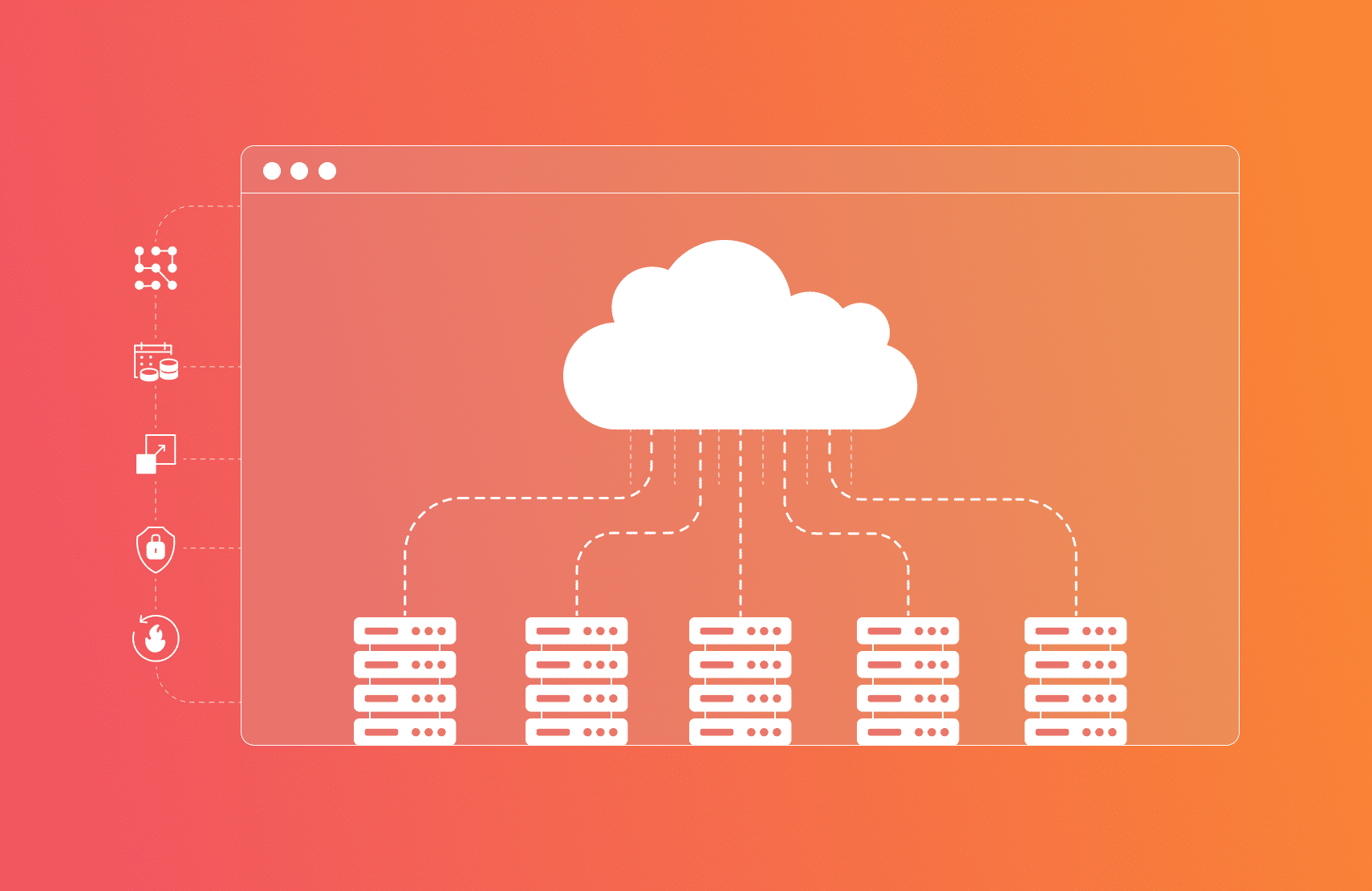The Top Cloud-Based E-Commerce Hosting Solutions in 2023

Top e-commerce hosting solutions leverage cloud-based infrastructures to enable customers to build robust and secure applications that meet the expectations of today’s modern consumers.
Compared to self-hosting, cloud-based hosting solutions are complex, cost-effective, scalable, secure, and have a disaster recovery plan.
Some of the best cloud-based e-commerce websites based on bandwidth offered and agility include AWS Serverless, Microsoft Azure, DigitalOcean, and EC2.
fabric’s dynamic and robust SaaS solution offers a seamless experience for even the most demanding enterprise customers.
E-commerce hosting refers to a platform used to host an e-commerce website or application. A typical e-commerce hosting platform includes security initiatives, payment processing services, shopping cart software, and more.
Most retailers used to self-host their software and maintain it with their in-house IT team. But with over two billion people purchasing goods or services online every year, e-commerce brands and retailers have begun to use cloud-based web hosting to provide their customers with a seamless online experience.
Cloud-based e-commerce hosting solutions let retailers build applications that scale efficiently, are secure, and are cost-effective. Using a cloud-based hosting solution leads to a 100% uptime, making it possible to address all the buyers’ needs, no matter how numerous they are.
[toc-embed headline=”Features of E-Commerce Hosting Platforms”]
Features of E-Commerce Hosting Platforms
One of the core motives that makes e-commerce brands switch to cloud-based web hosting is the many features that make application building and hosting easy. It lets them build applications that meet not only industry standards but also customer needs.
Here is a summary of some of the common features to expect from the top e-commerce web hosts.
| Feature | What it does |
| Complexity | It makes it possible to build cloud-based applications that are always uptime and customizable. |
| Pay as you use | This lets customers who have unique and demanding requirements pay only for the features they need. |
| Scalability | This lets e-commerce providers build web applications that adapt to the most demanding situations. |
| Security | It ensures the safety of web applications and customer data. |
| Disaster recovery | This provides e-commerce businesses with a recovery plan when a disaster or outage happens. |
Complexity
Most enterprise-level e-commerce businesses maintain applications with a heavy product catalog, which can be challenging at times. This is mainly because the catalog needs to be searchable, and each page contains large amounts of data such as photos and videos. Regardless, 47% of consumers expect page load speeds of two seconds or less.
E-commerce cloud hosting providers allow retailers to build responsive web apps and native mobile apps to accommodate all static content with no latency. On top of that, they enable loose coupling, which means that each e-commerce application works independently.
A complex e-commerce hosting platform also leverages serverless computing to build and connect all your e-commerce applications altogether. At fabric, we use serverless architectures to build and support our Platform-as-a-service (PaaS) and Software-as-a-service (SaaS). As a result, e-commerce applications experience faster deployment times, optimizing management costs.
Pay as you use
Retailers who choose to self-host their platform can pay Magento license fees as high as $190,000. While this may not seem like a lot for an enterprise e-commerce site, there is a hidden “e-commerce tax” associated with monolithic e-commerce hosting solutions, such as maintenance and technical labor costs.
Cloud-based e-commerce hosting platforms come with substantial savings and many more features. Since premium price does not necessarily imply more features, some e-commerce hosting solutions, especially Platform-as-a-Service (PaaS) and serverless platforms offer a pay-as-you-use option.
Note: When pursuing affordability, avoid choosing the cheapest option as this usually leaves you looking for extra add-ons elsewhere, and ultimately being more expensive.
Scalability
Both self-hosted and cloud-based platforms can scale as wanted. But as long as the e-commerce application is not hosted on the cloud, it is prone to technical failures.
For example, about a decade ago, Walmart Canada’s online platform failed on Black Fridays for two years in a row. That is because their monolithic system at the time was built on an architecture that couldn’t handle six million page views per minute.
An enterprise-level e-commerce hosting solution, however, lets retailers cater to even the most demanding traffic surges. Instead of straining retailers to hire a technical workforce and spend on maintenance, cloud-based e-commerce hosting solutions can scale and adapt as they grow.
More importantly, factors such as caching and content delivery network (CDN) that can interfere with performance are well managed in order to negate downtime and slow loads. This is crucial in that it gives customers a better experience.
Security
More than 32.4% of piracy around the world occurs in the e-commerce sector, making it the most pirated sector ahead of the banking sector, which accounts for 24.7%. Thus it goes without saying that a good e-commerce web host must offer the highest possible level of security to protect both customers and merchants.
An effective web hosting solution allows e-commerce platforms to comply with a set of standards that apply to e-commerce payment, including:
- Payment Card Industry Data Security Standard (PCI-DSS).
- General Data Protection Regulation (GDPR)
- California Consumer Privacy Act (CCPA)
- International Organization for Standardization (ISO).
- Transport Layer Security (TLS)
- Secure Sockets Layer (SSL)
- HTTPS authentication
- Multi-factor authentication (MFA)
- 2-factor authentication (2FA) or 2-step verification (2SV)
Unlike on-premise e-commerce hosting that requires merchants to manage the security of their software themselves, cloud-based hosting platforms allow for one core codebase across all stores. This codebase is regulated and protected by the host’s technical team.
Disaster Recovery
According to a 2019 study, nearly 96% of businesses have experienced at least one outage over the last three years, and 75% of them do not have a disaster recovery plan of any kind in place.
The cloud-based disaster recovery feature lets e-commerce brands capitalize on continuity and uptime by replicating their data to a cloud infrastructure. It also manages the failover and failback process when a disaster happens.
Disaster recovery also allows organizations legally required to comply with industry regulatory requirements—such as HIPAA, PCI, GDPR, SOC 2—to remain compliant without hiring experts.
[toc-embed headline=”The Top Cloud-Based E-Commerce Hosting Solutions”]
The Top Cloud-Based E-Commerce Hosting Solutions
There are many e-commerce hosting providers, but only a few allow e-commerce companies to build and scale applications that require massive bandwidth. Below are the top four cloud-based e-commerce hosting solutions based on bandwidth and agility.
AWS Serverless
AWS offers an expanded set of services—including AWS Lambda, Amazon DynamoDB, Amazon API Gateway, and AWS Fargate—that make it easy to implement the serverless architecture.
The AWS Serverless ecosystem natively integrates with more than 200 AWS services and SaaS applications and removes infrastructure management tasks such as capacity provisioning and patching. However, it does require advanced software development skills.
The platform is designed to scale as needed, and there is no need for additional maintenance costs or labor as this is all handled by the hosting provider. However, because AWS Serverless operates for many clients, it is open to many security issues.
- Complexity: The AWS ecosystem comes with hundreds of integrations.
- Pay as you use: Yes, it does not incur charges when functions aren’t running.
- Scalability: AWS has a wide range of integration and features that lets enterprises scale easily.
- Security: The platform in itself is secure but is prone to some security issues as it serves several vendors that may not be secure.
- Disaster recovery: It backs up AWS Lambda functions so they can be restored in another region in the event of a disaster.
Microsoft Azure
Initially released on February 1, 2010, Microsoft Azure is the second-largest PaaS and IaaS service on the planet, behind AWS. Azure has a reputation for being a reliable, sophisticated, and highly secure public cloud provider, which is why Gartner ranked it as a leader in the cloud infrastructure as a service space.
Microsoft Azure offers high availability and redundancy across data centers, allowing it to deliver a 99.95% service level agreement (SLA). It’s open-source friendly, which means e-commerce developers can customize it to their liking.
With Azure, e-commerce businesses pay only for what they use. Moreover, it allows companies to run both internal and client applications in the cloud, which reduces IT infrastructure and maintenance costs.
Azure focuses on security and follows the standard Detect, Assess, Diagnose, Stabilize and Close security model. As a result, it has earned multiple compliance certifications and has positioned itself as a leader in IaaS security.
- Complexity: It has many features that make it one of the most used cloud-based e-commerce hosting platforms.
- Pay as you use: Yes, it requires e-commerce brands to only pay for what they use.
- Scalability: Microsoft Azure makes it easy for e-commerce businesses to scale up as they grow with a single click.
- Security: Azure is a renowned leader in the cloud security space.
- Disaster recovery: Azure is one of the first public clouds to offer a native disaster recovery service for applications running on virtual machines.
DigitalOcean
DigitalOcean is geared toward simplifying the complexities of infrastructure for e-commerce software developers. The DigitalOcean team handles the infrastructure, so developers can focus their time on building robust applications.
In 2017, DigitalOcean was ranked the third-largest cloud-based hosting ecosystem. Its flagship offering is Droplet, which is a virtual machine for building enterprise-grade applications. DigitalOcean Droplets are perfect for scaling. It allows you to add more CPU, memory, or storage with a click of a button.
DigitalOcean outperforms most e-commerce hosting cloud solutions in uptime, delivering an average of 99.99%. In addition, the platform is developer-friendly and ensures that your data is protected from end-to-end.
Most providers offer five different plans maximum, which give you a good overview of what you get. With DigitalOcean, there are pricing options for bandwidth, space, servers, CPU, and security options. These various packages tend to be confusing and overwhelming.
- Complexity: It has one of the best uptime compared to others.
- Pay as you use: Despite being cost-effective, its pricing structure is confusing.
- Scalability: Droplets make it easy for enterprises to scale as needed.
- Security: DigitalOcean is open source, so it’s protected end-to-end.
- Disaster recovery: It has a disaster recovery option, but it is not automatic.
EC2
Amazon Elastic Cloud Compute (EC2) is one of the most powerful and widely used services on AWS. It makes developers’ lives easier by providing secure, scalable computing capacity and can be integrated with many other AWS services.
With its on-demand infrastructure, EC2 lets e-commerce businesses choose their preferred OS, programming language, and web application platform, making it easy to build any software in a virtual ecosystem.
EC2 is built to support very demanding e-commerce applications, which means that it can accommodate unlimited bandwidth for high-traffic websites. However, its fees depend on several factors such as land, taxes, electricity, and fiber.
AWS EC2 consists of security groups that act as virtual firewalls that control traffic to the EC2 instances. Rules can be set in each security group by users, and these rules can be changed at any time. This means that security measures can be easily implemented.
- Complexity: In addition to its on-demand infrastructure, EC2 also integrates with most AWS applications.
- Pay as you use: Its pricing structure is confusing.
- Scalability: It is built to support very demanding e-commerce applications and can accommodate unlimited bandwidth for high-traffic websites.
- Security: It is secure, like most Amazon cloud services, but its vulnerability comes from the vendors it serves.
- Disaster recovery: CloudEndure Disaster Recovery lets e-commerce enterprises use AWS Cloud as a disaster recovery Region for applications and databases hosted on EC2.

Content marketer @ fabric. Previously marketing @ KHON-TV and Paramount Pictures.